The Intel Core i9-9900KS Review: The 5 GHz Consumer Special
by Dr. Ian Cutress on October 31, 2019 10:45 AM ESTCPU Performance: Rendering Tests
Rendering is often a key target for processor workloads, lending itself to a professional environment. It comes in different formats as well, from 3D rendering through rasterization, such as games, or by ray tracing, and invokes the ability of the software to manage meshes, textures, collisions, aliasing, physics (in animations), and discarding unnecessary work. Most renderers offer CPU code paths, while a few use GPUs and select environments use FPGAs or dedicated ASICs. For big studios however, CPUs are still the hardware of choice.
All of our benchmark results can also be found in our benchmark engine, Bench.
Corona 1.3: Performance Render
An advanced performance based renderer for software such as 3ds Max and Cinema 4D, the Corona benchmark renders a generated scene as a standard under its 1.3 software version. Normally the GUI implementation of the benchmark shows the scene being built, and allows the user to upload the result as a ‘time to complete’.
We got in contact with the developer who gave us a command line version of the benchmark that does a direct output of results. Rather than reporting time, we report the average number of rays per second across six runs, as the performance scaling of a result per unit time is typically visually easier to understand.
The Corona benchmark website can be found at https://corona-renderer.com/benchmark
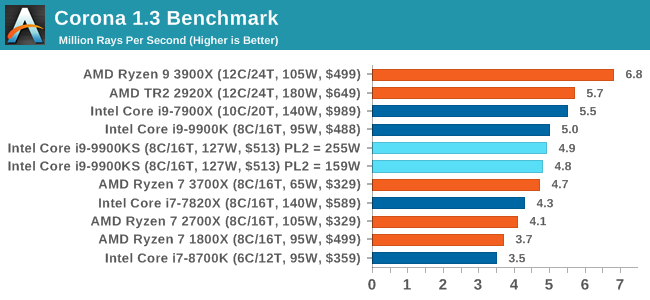
Interestingly both 9900KS settings performed slightly worse than the 9900K here, which you wouldn't expect given the all-core turbo being higher. It would appear that there is something else the bottleneck in this test.
Blender 2.79b: 3D Creation Suite
A high profile rendering tool, Blender is open-source allowing for massive amounts of configurability, and is used by a number of high-profile animation studios worldwide. The organization recently released a Blender benchmark package, a couple of weeks after we had narrowed our Blender test for our new suite, however their test can take over an hour. For our results, we run one of the sub-tests in that suite through the command line - a standard ‘bmw27’ scene in CPU only mode, and measure the time to complete the render.
Blender can be downloaded at https://www.blender.org/download/
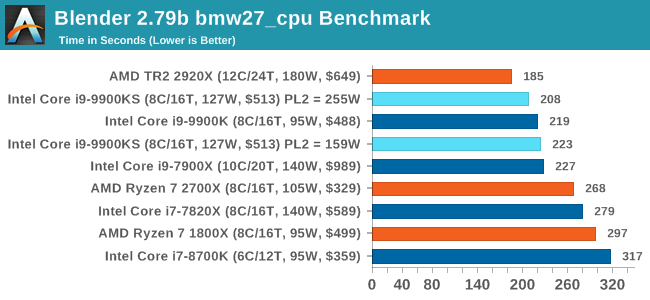
All the 9900 parts and settings perform roughly the same with one another, however the PL2 255W setting on the 9900KS does allow it to get a small ~5% advantage over the standard 9900K.
LuxMark v3.1: LuxRender via Different Code Paths
As stated at the top, there are many different ways to process rendering data: CPU, GPU, Accelerator, and others. On top of that, there are many frameworks and APIs in which to program, depending on how the software will be used. LuxMark, a benchmark developed using the LuxRender engine, offers several different scenes and APIs.
In our test, we run the simple ‘Ball’ scene on both the C++ and OpenCL code paths, but in CPU mode. This scene starts with a rough render and slowly improves the quality over two minutes, giving a final result in what is essentially an average ‘kilorays per second’.
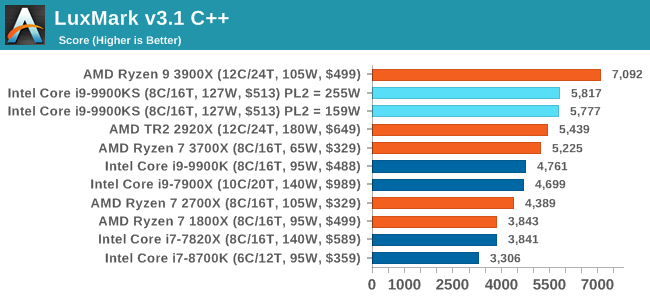
Both 9900KS settings perform equally well here, and a sizeable jump over the standard 9900K.
POV-Ray 3.7.1: Ray Tracing
The Persistence of Vision ray tracing engine is another well-known benchmarking tool, which was in a state of relative hibernation until AMD released its Zen processors, to which suddenly both Intel and AMD were submitting code to the main branch of the open source project. For our test, we use the built-in benchmark for all-cores, called from the command line.
POV-Ray can be downloaded from http://www.povray.org/
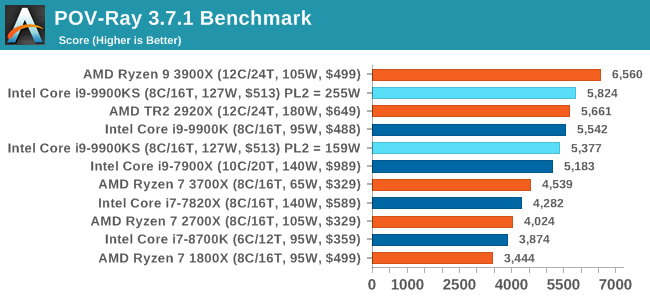
One of the biggest differences between the two power settings is in POV-Ray, with a marked frequency difference. In fact, the 159W setting on the 9900KS puts it below our standard settings for the 9900K, which likely had an big default turbo budget on the board it was on at the time.


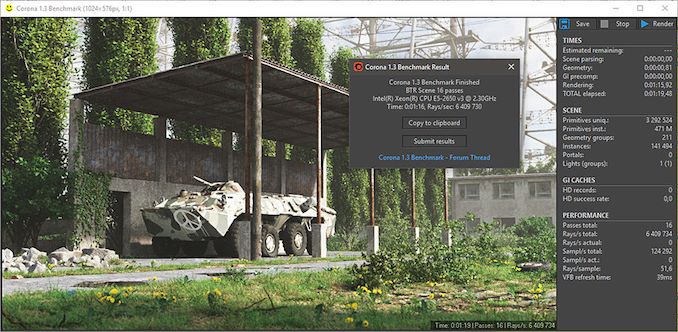








235 Comments
View All Comments
Shekels - Saturday, November 2, 2019 - link
Y'all are not understanding vMax65 whatsoever. He's talking about IN GAMES and not in benchmarks. It is extremely rare for your CPU to come close to 100% utilisation while playing games unless you're running a competitive setup at super low settings in a game like Overwatch or CSGO. Just because a CPU is running at all core 5ghz doesn't mean it's consuming 172W. No its consuming 172W at 100% utilisation. So with that being said, when you're using it at 70-80% utilisation it will consumer far less power so the 90ish W to 125W makes complete sense. I hate Intel and their practices, and their CPUs are overpriced and uncompetitive, but don't spread false information without understanding how a CPU even draws power...RSAUser - Wednesday, November 6, 2019 - link
I'm very, very sure it will not run at all-core 100% 5 GHz for CS:GO and I still don't know why you'd want to do it. I'd limit it to just above monitor refresh rate.Korguz - Saturday, November 2, 2019 - link
ahhh.. so you are trying to compare apples to oranges......liquid_c - Sunday, November 3, 2019 - link
For a CPU directed towards power gamers, tell me, please, in what circumstances do you see a gamer or a normal, day to day user, execute Cinebench on their PC? Stop being such a dummy and stop acting like a rabid dog over a product that not only you will never get but clearly, it's not geared towards you.Korguz - Sunday, November 3, 2019 - link
and keep in mind the test bed were DIFFERENT, that is a factor there as well. how would you know if some one would never get this cpu ?? and now you resort insults and name calling?? that makes your opions, pointless.satai - Thursday, October 31, 2019 - link
Can we get compilation benchmarks, pretty please?lux44 - Thursday, October 31, 2019 - link
Would it be possible to find a compilation benchmark? Chrome or Firefox perhaps? I remember Linux kernel compilation finished in 30 seconds, perhaps it's getting too small...Given .Net Core is cross platform, maybe compiling the platform itself or Roslyn compiler? If I remember correctly, compiling the framework right now is not trivial, but the goal is to streamline it for .Net 5 release.
Slash3 - Thursday, October 31, 2019 - link
Michael over at Phoronix has some compilation test results, but they are Linux centric.https://www.phoronix.com/scan.php?page=article&...
lux44 - Friday, November 1, 2019 - link
Thank you!dguy6789 - Thursday, October 31, 2019 - link
As long as you have good cooling every single 9900K ever made does all cores at 5Ghz all the time without any sort of turbo time limit when the motherboard has MCE(multi core enhancement) enabled- most have this enabled by default. The 9900KS is nothing new.